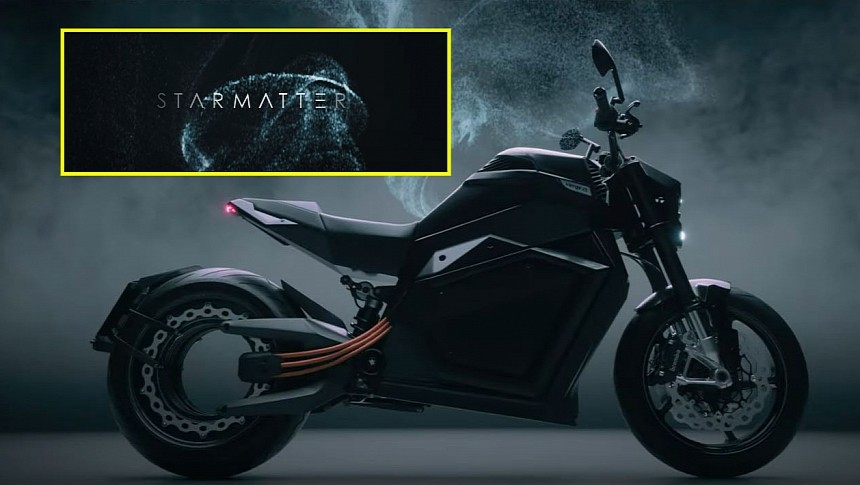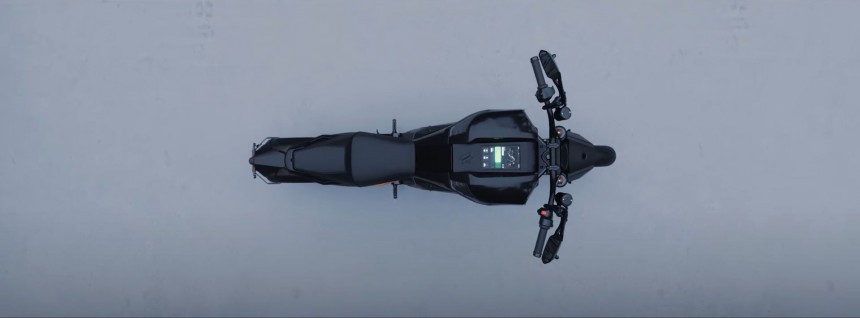Yes, you read that right: artificial intelligence (AI) is coming to motorcycles. It's not going to be something reserved exclusively for computer-savvy people or lawyers who want to get fined or scolded by a judge. Riders will enjoy some of its perks, too! But is now the right time to get excited about AI? Let's dive in and seek an answer.
Electric motorcycles are still a relatively novel concept in the western hemisphere. Asians are already using them extensively. Scooters dominate some Asian markets. Considering that almost all zero-emission two-wheelers are sold in that part of the world, their popularity is understandable.
Finland-based Verge, however, has taken a different approach. It started manufacturing the TS, a 540-lb motorcycle that puts out up to 885 lb-ft of torque. Although wild, that figure is very real. It's provided by one motor. If you are a good rider, this super e-bike will take from zero to 62 mph in 2.5 seconds.
Fortunately, there's enough stopping power, too. The Estonian-made bike uses two four-piston Brembo brakes with 320-mm discs at the front and one in-house developed brake at the rear. The latter makes use of a larger 380-mm disc. But because we're talking about an e-motorcycle here, it's important not to forget about regenerative braking. That feature will come in handy when the battery's not nearly full.
Inspired by both Apple and Samsung, Verge currently makes three versions of the same all-electric motorcycle: the TS and TS Pro that share the same 20.2-kWh battery, and the TS Ultra with its 21.8-kWh energy storage unit.
The company's current pricing policy shows that the:
The young company just started manufacturing the zero-emission bike with distinct exposed cables and an exterior design that seems to have escaped the TRON universe. It got the TS homologated for the European market and is in the process of making it to American regulators' taste. Deliveries are slated for 2024. The TS Pro will reach customers first next summer.
But those VAT-including prices are borderline disheartening. You could buy a very capable all-electric car for the price of the TS Ultra. For example, the refreshed Model 3 Long Range costs £49,990 in the UK, which amounts to €57,045 ($62,279).
Could artificial intelligence justify those figures?
But, as things stand at the time of writing, AI available to the public is nothing but a language-learning model (LLM). It's sort of a very advanced text chatbot that collects much of the human knowledge available online and reinterprets it when the human puts in the right prompt. Experts haven't yet managed to make machines think by themselves as humans do.
That's, of course, as far as we're being let known. More spicy things could be happening behind closed doors! Who knows what complex problem-solving abilities Elon Musk's Grok has, right?
But Verge might be onto something. You have to replace the mechanical beating heart with something. When gas can't burn in small, controlled explosions that get turned into sweet, sweet noise... Well, other tricks are necessary. Buyers aren't interested in only using the entire speedometer without feeling the rumble of their two-wheeler. Plus, Tesla proved that software is paramount for the EV era.
The platform will enable Verge to provide its customers with over-the-air updates, a customizable digital control center built on Unreal Engine, a comprehensive hardware suite for connected services and accurate data measurement. Last but not least, "advanced artificial intelligence" is joining the party.
The company will use artificial intelligence to improve each customer's ride experience. That could translate into automatically customizable settings, allowing buyers to rediscover their e-motorcycle.
But since the brand didn't sell any all-electric bikes yet, it has more time to put a stronger emphasis on this matter. Many things haven't been explored yet in this sector, and riders could benefit from superior adaptability.
Verge claims data and sensors will help it build machine learning models that will help it unleash "unprecedented intelligence features that set a new standard for motorcycle innovation."
Not very exciting, but definitely promising
All this sounds like the future is rushing to reach our contemporary reality, but it's unlikely that customers of such pricey bikes will care about all this geeky stuff. Riding has commonly been associated with raw freedom and high-intensity feelings. Allowing a computer to individualize one's experience may not be well received by the target audience.
However, we can see a time when e-motorcycles are as advanced as the latest battery-electric sedan or SUV on the road. Exactly how that could look is anyone's guess for the time being. But companies dreaming of profitability are responsible for giving us exciting products we want to buy and love to own. Verge could turn Starmatter into something great.
Imagine one e-bike that can help young or first-time riders approach this type of vehicle more confidently because the computer can choose the right settings from the get-go. Advanced tech and good software have a ton of great potential. Let's just hope Verge and others like them will treat data responsibly.
And no, they're not too early. The timing feels almost perfect, given how fast things happen in our highly interconnected era. However, the real test will follow next year. As customers take delivery of their all-electric motorcycles and spend time riding them, more information can be collected. Then, we'll see how it's put to good use.
Finland-based Verge, however, has taken a different approach. It started manufacturing the TS, a 540-lb motorcycle that puts out up to 885 lb-ft of torque. Although wild, that figure is very real. It's provided by one motor. If you are a good rider, this super e-bike will take from zero to 62 mph in 2.5 seconds.
Fortunately, there's enough stopping power, too. The Estonian-made bike uses two four-piston Brembo brakes with 320-mm discs at the front and one in-house developed brake at the rear. The latter makes use of a larger 380-mm disc. But because we're talking about an e-motorcycle here, it's important not to forget about regenerative braking. That feature will come in handy when the battery's not nearly full.
Inspired by both Apple and Samsung, Verge currently makes three versions of the same all-electric motorcycle: the TS and TS Pro that share the same 20.2-kWh battery, and the TS Ultra with its 21.8-kWh energy storage unit.
Clean fun doesn't come cheap
The TS has a range of up to 155 miles, the TS Pro covers up to 217 miles on a single charge, and the TS Ultra squeezes every electron to travel up to 233 miles on a full battery.The company's current pricing policy shows that the:
- TS costs €33,549 ($36,624) and offers an output of 107 hp and 516 lb-ft of torque, which is enough to propel it from zero to 62 mph in 4.5 seconds and a maximum speed of 112 mph;
- TS Pro costs €37,179 ($40,586) and develops 137 hp and that insane 738 lb-ft of torque, which is more than enough to go from zero to 62 mph in 3.5 seconds and achieve a top speed of 124 mph;
- TS Ultra costs €55,329 ($60,405) and packs one mean punch with its 201 hp and 885 lb-ft of torque, which help it go from zero to 62 mph in 2.5 seconds and keep accelerating until the 124-mph mark is reached.
The young company just started manufacturing the zero-emission bike with distinct exposed cables and an exterior design that seems to have escaped the TRON universe. It got the TS homologated for the European market and is in the process of making it to American regulators' taste. Deliveries are slated for 2024. The TS Pro will reach customers first next summer.
But those VAT-including prices are borderline disheartening. You could buy a very capable all-electric car for the price of the TS Ultra. For example, the refreshed Model 3 Long Range costs £49,990 in the UK, which amounts to €57,045 ($62,279).
A digital mind for an online world
Whether or not it can, Verge presented Starmatter as something groundbreaking. AI is certainly this year's buzzword and has been extensively used by tech companies and automakers.But, as things stand at the time of writing, AI available to the public is nothing but a language-learning model (LLM). It's sort of a very advanced text chatbot that collects much of the human knowledge available online and reinterprets it when the human puts in the right prompt. Experts haven't yet managed to make machines think by themselves as humans do.
That's, of course, as far as we're being let known. More spicy things could be happening behind closed doors! Who knows what complex problem-solving abilities Elon Musk's Grok has, right?
Putting 0 and 1 together
So, Verge claims that Starmatter will help it create a "bridge between today's exceptional ride and tomorrow's even more remarkable one." That's quite the statement! But the young brand doubles down on this promise and says AI will enable it to create "better, smarter, and more exciting" rides.The platform will enable Verge to provide its customers with over-the-air updates, a customizable digital control center built on Unreal Engine, a comprehensive hardware suite for connected services and accurate data measurement. Last but not least, "advanced artificial intelligence" is joining the party.
The company will use artificial intelligence to improve each customer's ride experience. That could translate into automatically customizable settings, allowing buyers to rediscover their e-motorcycle.
But since the brand didn't sell any all-electric bikes yet, it has more time to put a stronger emphasis on this matter. Many things haven't been explored yet in this sector, and riders could benefit from superior adaptability.
Not very exciting, but definitely promising
All this sounds like the future is rushing to reach our contemporary reality, but it's unlikely that customers of such pricey bikes will care about all this geeky stuff. Riding has commonly been associated with raw freedom and high-intensity feelings. Allowing a computer to individualize one's experience may not be well received by the target audience.
However, we can see a time when e-motorcycles are as advanced as the latest battery-electric sedan or SUV on the road. Exactly how that could look is anyone's guess for the time being. But companies dreaming of profitability are responsible for giving us exciting products we want to buy and love to own. Verge could turn Starmatter into something great.
Imagine one e-bike that can help young or first-time riders approach this type of vehicle more confidently because the computer can choose the right settings from the get-go. Advanced tech and good software have a ton of great potential. Let's just hope Verge and others like them will treat data responsibly.
And no, they're not too early. The timing feels almost perfect, given how fast things happen in our highly interconnected era. However, the real test will follow next year. As customers take delivery of their all-electric motorcycles and spend time riding them, more information can be collected. Then, we'll see how it's put to good use.






